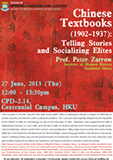
| News & Events |
| 27 June 2013 | |
Talk: Ms Peter Zarrow Date: 27 June 2013 |
|
From its origins in the late Qing, the new state school system relied on textbooks to impose a degree of uniformity on schools, students, and teachers under a variety of conditions. The curriculum was originally designed for the education of the children of elites but increasingly focused on the education of elites. Textbooks could supplement the skills of highly trained teachers or could make up for the lack of skills of untrained teachers as the school system rapidly spread. Critical to textbooks—at least outside of the sciences—was narrativization Telling stories had a number of functions: history textbooks could emplotthe overall structure of Chinese identity; Chinese language readers could introduce new vocabulary in a relatively painless way and also provide models of social behavior; and self-cultivation and civics textbooks could give models of virtues for emulation and avoidance, and begin to introduce concepts of state and society. Peter Zarrow is research fellow at the Institute of Modern History, Academia Sinica. His interests revolve around the intellectual and cultural history of China in the nineteenth and twentieth centuries. Zarrow previously taught Chinese history at Vanderbilt University and the University of New South Wales. His recent publications include After Empire: The Conceptual Transformation of the Chinese State, 1885-1924(Stanford, 2012), China in War and Revolution, 1895-1949(Routledge, 2005), and articles on Sun Yat-sen, journalism, historiography, and textbooks in early twentieth-century China. All are welcome. No registration is required. For enquiries, please contact Dr John Wong at jdwong@hku.hk. |
|
